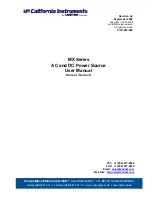
5.3 SET Menu
APS-1102 Programmable AC/DC Power Source
5-16
5.3.1
Output mode setting
Table 5-12
lists the eight output modes that can be selected (based on combinations of two operation
modes and four signal source modes).
The mode cannot be changed when output is on. Turn output off before entering settings.
Table 5-12. Output Modes
Operation Mode
Signal Source Mode
Output Mode
AC (alternate current)
INT (internal)
AC-INT
EXT (external)
AC-EXT
ADD (in external)
AC-ADD
SYNC (external synchronization)
AC-SYNC
AC+DC
(direct current)
INT (internal)
AC+DC-INT
EXT (external)
AC+DC-EXT
ADD (in external)
AC+DC-ADD
SYNC (external synchronization)
AC+DC-SYNC
Selection of operation mode
The APS-1102 enables selection between two operation modes: AC (alternate current) and AC+DC
(direct current).
AC:
In this mode, the APS-1102 is used as an AC constant voltage source. The voltage
supplied to the load is proportionate to the set value or the input signal. The DC
component is removed.
AC+DC: In this mode, the APS-1102 is used as a DC constant voltage source. The voltage supplied
to the load is proportionate to the set value or the input signal.
Selection of signal source
The APS-1102 enables selection of four signal source modes: INT (internal), EXT (external), ADD
(in external), and SYNC (external synchronization).
INT:
The APS-1102 internal signal source is used. DC or AC set via the control panel menu is
output.
EXT:
Signals from an external signal that is connected to the external signal input/external sync
signal input terminal (EXT SIG IN/EXT SYNC IN) on the rear panel are output as external
input gain amplified signals.
ADD:
In this mode, a waveform comprised of the above INT and EXT signal sources is output.
SYNC: In this mode, the output waveform is synchronized with either an external sync signal
source (TTL) connected to the external signal input/external sync signal input terminal
(EXT SIG IN/EXT SYNC IN) on the rear panel or the input power line.













































